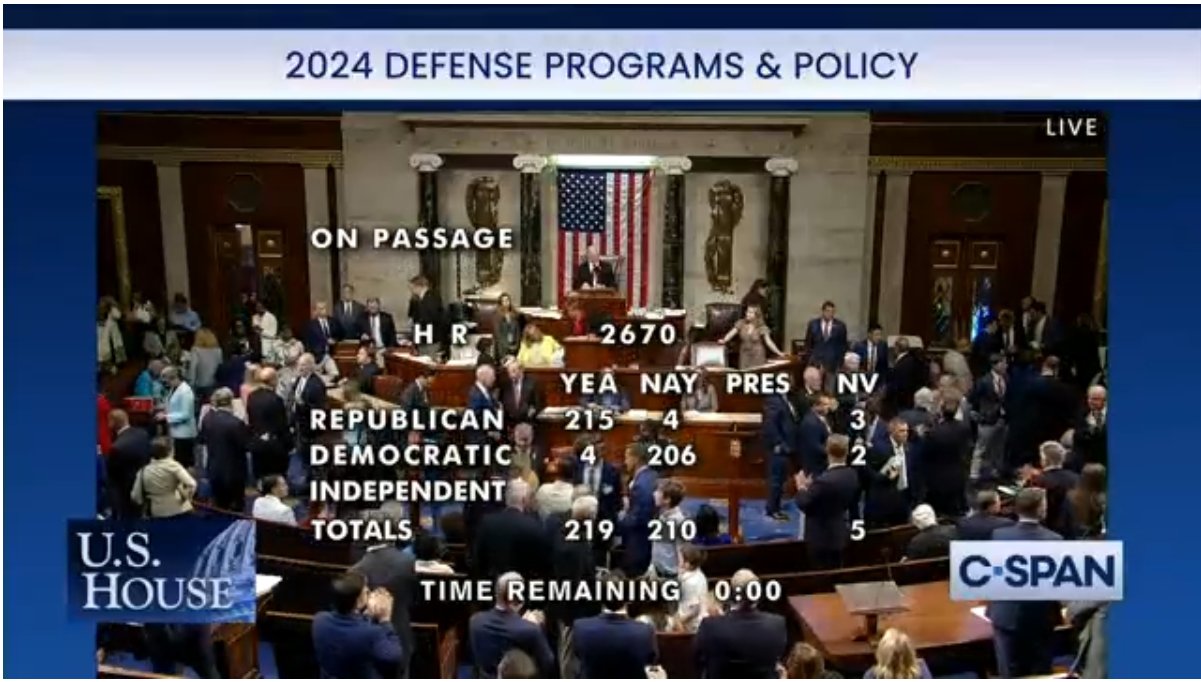
The Fiscal Year 2024 National Defense Authorization Act narrowly passed the House of Representatives on Friday morning, when four lawmakers from each party crossed the aisle for a final vote of 219 to 210.
Emerging earlier this week from the House Rules Committee, the bill ended up with a few additions pertaining to the National Nuclear Security Administration’s (NNSA) defense activities, including detection of nuclear explosions outside the U.S. and deployment of microreactors for defense purposes.
Passage of the annual defense policy bill was briefly in question Thursday evening into Friday morning, as Republicans, largely along party lines, amended the bill to bar certain transgender medical services, abortion and diversity training at the Pentagon. Nearly all Democrats then decided to oppose the bill, but the House mustered a passing vote on Friday morning.
An amendment from Rep. Bill Foster (D-Ill.) officially appoints the NNSA as the interagency lead on nuclear forensics, “making NNSA responsible for integrating the National Technical Nuclear Forensics (NTNF) activities in a consistent, unified strategic direction.”
“The majority of our nuclear forensics analytic capabilities, including the technical expertise, the infrastructure, all reside within the [Department of Energy] national laboratories, and while many agencies have a peripheral role, it is only NNSA within DOE that works across every aspect of nuclear forensics and understands the very classified details of our weapons designs and the weapons designs of our of our enemies,” Foster said earlier in the week in defense of his amendment.
Another of Foster’s amendments, also made in order, calls for an assessment by the Defense Intelligence Agency, coordinating with the Director of National Intelligence, of the U.S. ability to detect and monitor supercritical nuclear weapons tests conducted at very low yields. The amendment does not specify what magnitude of explosion constitutes a “very-low yield” but points fingers at the Novaya Zemlya nuclear test site in Russia and the Lop Nor nuclear test site in China.
Rep. John Garamendi’s (D-Calif.) amendment eliminating the requirement that the NNSA produce at least 30 war reserve plutonium pits per year “during 2026” and 80 pits “during 2030,” was not in order. Garamendi sought to give the NNSA administrator a chance to reach the milestones ‘‘during a period that the Administrator for Nuclear Security determines technically achievable and cost-effective.” It was the second time the dovish Garamendi failed to amend the bill this way since debate began in the Armed Services Committee.
Another loser, this time on the floor, was a proposal from Rep. Earl Blumenhauer (D-Ore.) to halt all efforts at retiring the B83-1 gravity bomb, from which the NNSA proposed cutting $28 million in its fiscal 2024 budget request. The proposal was part of an 11th-hour package of amendments and went down 198-217, with most Democrats voting against it.
Meanwhile, an amendment offered by Rep. Byron Donalds (R-Fla.) that made it into the House NDAA codifies congressional support for Project Pele, a program headed by the Defense Department’s Strategic Capabilities Office to develop, demonstrate and deploy a portable nuclear microreactor “to bolster American national security and reduce fuel-related logistical challenges.”
While the U.S. has long powered its submarines and aircraft carriers with nuclear reactors, Congress is now interested in deploying micro-reactors to reduce the fuel logistics burden for other military services, including the Army and Space Force.
Another of Donalds’ amendments has the Army Corps of Engineers, in partnership with the National Guard, develop a strategy for deploying microreactors that could provide power in the wake of natural disasters like hurricanes.
Donalds also offered an amendment requiring the Space Force to submit a report on its plans for using nuclear thermal and nuclear electric propulsion to power space vehicles and “how these nuclear-powered space vehicles can bolster America’s national security.”
Yet another of Donalds’ amendments to the bill called for an assessment of how advanced nuclear reactors can improve domestic and international military operations while reducing fuel-related logistical challenges.